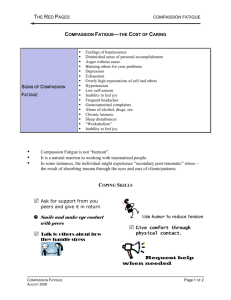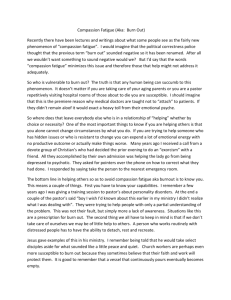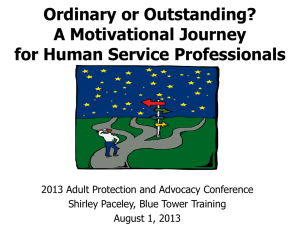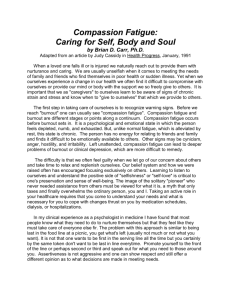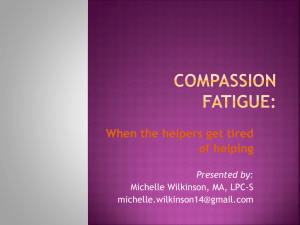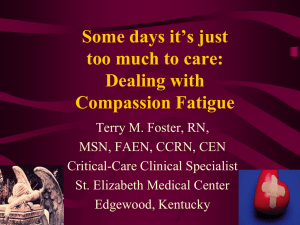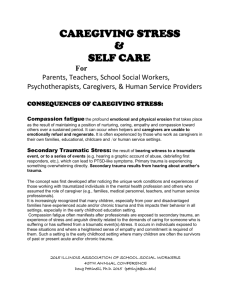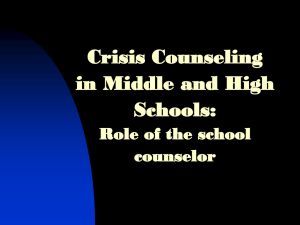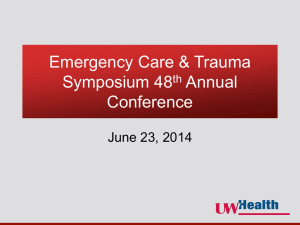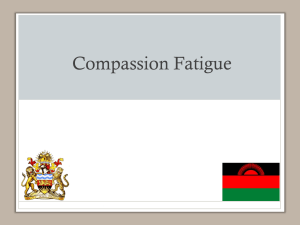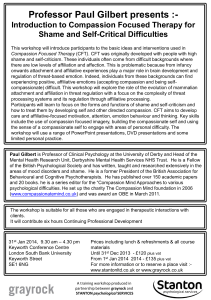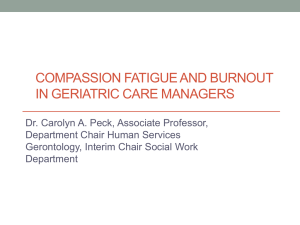Preventing-Compassion-Fatigue
advertisement
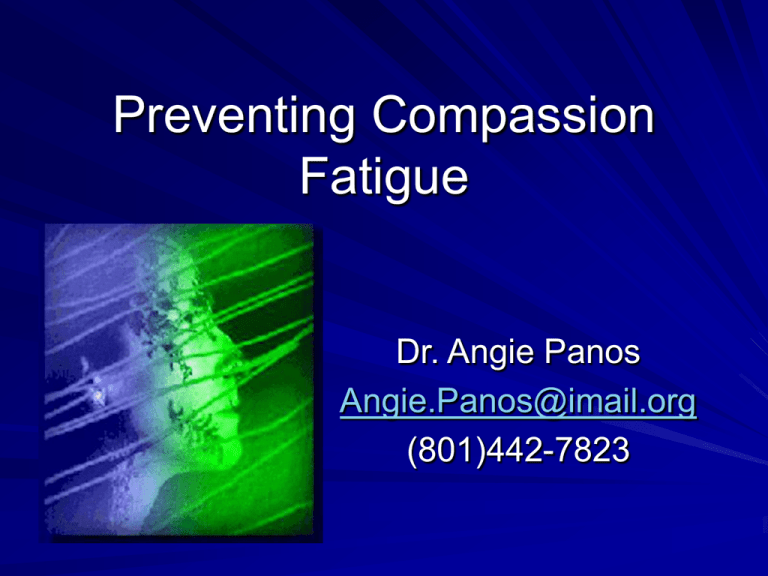
Preventing Compassion Fatigue Dr. Angie Panos Angie.Panos@imail.org (801)442-7823 Objectives Analyze factors which lead to compassion fatigue in your work Identify coping strategies that you can use to increase your resiliency Develop ways to find support for yourself and give support to your colleagues Definition of Compassion Fatigue Also called “vicarious traumatization” or secondary traumatization (Figley, 1995) Refers to the PTSD-related symptoms due to working with patients and families who have trauma and grief Differs from burn-out, but can coexist Can occur due to exposure on one case or can be due to a “cumulative” level of trauma Compassion Fatigue Symptoms Affects many dimensions of your wellbeing Nervous system arousal (Sleep disturbance) Emotional intensity increases Cognitive ability decreases Behavior and judgment impaired Isolation and loss of morale Symptoms, continued Depression and PTSD (potentiate) Loss of self-worth and emotional modulation Identity, worldview, and spirituality impacted Beliefs and psychological needs-safety, trust, esteem, intimacy, and control Loss of hope and meaning=existential despair Anger toward perpetrators or causal events Small Group Exercise #1 Discuss a case that caused you to take it home with you- or caused some symptoms of compassion fatigue Identify what factors caused you to identify with the person/victim/family/event Note commonalities and choose a person to share these findings with the larger group The ABC’s of Prevention A= Awareness B=Balance C=Connections A= Awareness Issues and Contributing Factors What types of cases contribute to your stress level increasing your vulnerability to compassion fatigue? What events or cases can cause compassion fatigue? Events or situation that causes one to experience an unusually strong reaction Often overpowers one’s usual coping mechanisms A= Awareness, continued Ability to function is interfered with or altered. Situation or incident does not seem “typical or ordinary”, it feels traumatic. “Compassion stress” impinges upon or breaks through normal boundaries Awareness, continued Regularly waking up tired in the morning and struggling to get to work? Feeling as if you are working harder but accomplishing less? Becoming frustrated/irritated easily? Losing compassion for some people while becoming over involved in others? Routinely feeling bored or disgusted? Experiencing illness, aches and pains? Even Mother Teresa Understood Compassion Fatigue Recognized the effects Wrote in her plan to her superiors that it was MANDATORY for her nuns to take an entire year off from their duties every 4-5 years to allow them to heal from the effects of their care-giving work. Small Group Exercise #2 A. Discuss causal factors of Compassion Fatigue: Each helper’s empathic engagement with each client’s unique experience; Helper’s unique personal response based on personal history, style, current life circumstances, as well as proximity and personal connection to the events and people involved in the trauma/tragedy B. Discuss potential consequences for undiagnosed and untreated compassion fatigue. C. Report findings to large group “The quality of strength lined with tenderness is an unbeatable combination…”- Maya Angelou Self-Awareness Exercises Compassion Fatigue Test Life Balance scale Here is a tool you can use to assess the level of your satisfaction with all of the aspects of your life. Place each aspect of your life in the space in each segment. Some suggestions follow. Modify these to represent those that are meaningful to you. •Self Care •Work •Intimate Partner/Family •Friends/Social Life •Financial Aspects •Health & Wellness/Body Image •Spiritual Aspects •Community/Service Now rate your satisfaction with each aspect, using a scale from zero to ten, with ten being very satisfied and zero being completely unsatisfied. Place a mark indicating your choice in each segment of the circle, with zero at the center and ten at the rim. Connect all of the marks around the circle to see how balanced your wheel is. B= Balance Keeping Your Life in Balance Practice excellent self-care Nurture yourself by putting activities in your schedule that are sources of pleasure, joy and diversion Allow yourself to take mini-escapes- these relieve the intensity of your work Transform the negative impact of your work (find meaning, challenge negativity, find gratitude) Small Group Exercise #3 List one mini-escape or diversion that worked well to restore and renew you List one thing that brings you joy Report back to larger group your unique ideas B= Balance Keeping Your Life in Balance, continued Get medical treatment if needed to relieve symptoms that interfere with daily functioning- don’t use alcohol or drugs to self-medicate Get professional help when needed to get back on track- we all need coaches and consultants at times "We can be sure that the greatest hope for maintaining equilibrium in the face of any situation rests within ourselves." Francis J. Braceland Balance for our Emotional Needs Emotions are a signal that tell us when something is wrong or we are out of balance We all need meaning and purpose in our life We all need autonomy and freedom to make choices that bring us balance and happiness And the Wise Man Said… The student asked the wise man… When one is fatigued, doesn’t one need rest from their duties? and the wise man said…. “Sometimes yes, but sometimes all you need is to do your work more whole-heartedly.” Find Hidden Passion We all have hidden sources of energy and healing power. When you identify the things that fuel you, the things that you have true passion for, your fatigue will disappear. Balancing your life involves putting the things that we value and have passion for in our schedule. Patanjali – the author of Yoga Sutra “When you are inspired by some great purpose, some extraordinary project, all your thoughts break their bonds: Your mind transcends limitations, your consciousness expands in every direction, and you find yourself in a new, great, and wonderful world. Dormant forces, faculties and talents become alive, and you discover yourself to be a greater person by far than you ever dreamed yourself to be.” Balance for Your Soul Have quiet alone time in a calm, beautiful placea safe retreat where you feel renewed Have an awareness of what restores and replenishes you. Find ways to acknowledge loss and grief Stay clear with commitment to career goals or your personal mission Know how to focus on what you can control Look at situations as entertaining challenges and opportunities, not problems or stresses "Balance, peace, and joy are the fruit of a successful life. It starts with recognizing your talents and finding ways to serve others by using them." Thomas Kinkade Chinese Proverb Equation for the value of your life – Your Health = 1 – Everything else in your life = 0 – Put a one first, in front of all the zeros and you will have the value of your life Without your health, you have nothing. Keep Yourself Physically Strong – Exercise – Relax-Breathe – Get adequate sleep – Good nutrition and water – Good medical and preventative care C= Connections Talk out your stress- process your thoughts and reactions with someone else (coworker, therapist, clergy, friend, family, supervisor) Build a positive support system that supports you, not fuels your stress Pets accept whatever affection you are able to give them without asking for more---Pets are basically invulnerable to “provider burnout”-Blood pressure and heart rate decrease when interacting with animals Put Joy, Love, Hope, Laughter and Gratitude in Each Day Name 3 things you feel grateful for todayThink of something that has brought you a sense of joy (Make your top ten list) Who do you love that you can reach out to today? (Call them!) What made you laugh today? (Share it!) Hope does not take away your problems. It can lift you above them. Maya Angelou
